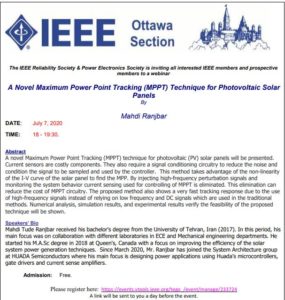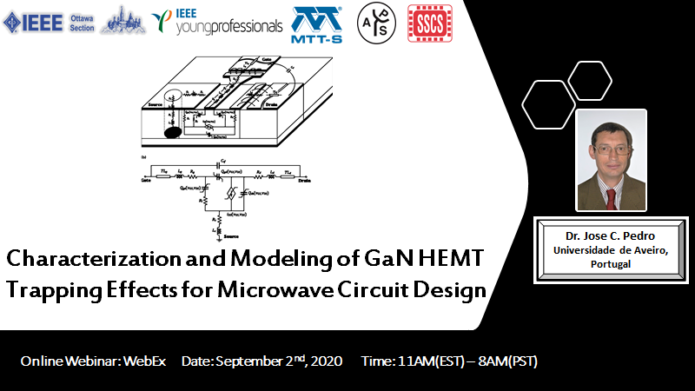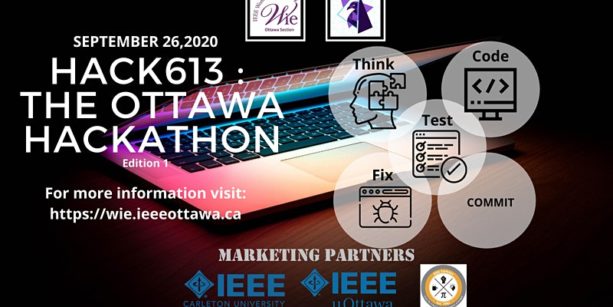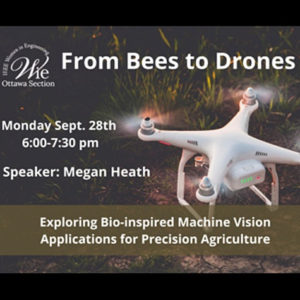Events

|
The IEEE Reliability Society & Power Electronics  A Novel Maximum Power Point Tracking (MPPT) Technique for Photovoltaic Solar Panels By  Mahdi Ranjbar DATE:      July 7, 2020 TIME:       18 – 19:30.     A  Mahdi
A link will be sent to you a day before the event. Â |

IEEE Ottawa Section: MTT-S / AP-S Chapter presents:
Title: Characterization and Modeling of GaN HEMT Trapping Effects for Microwave Circuit Design
Date: September 2nd, 2020
Time: 11 AM (ET)
Register at: https://events.vtools.ieee.org/m/238482
This talk will review some recent advancements achieved on the characterization and modelling of the trapping effects felt in GaN HEMT transistors, and their impact on microwave circuit design. Because of their nowadays importance, a particular attention will be payed to applications on high power amplifiers for mobile wireless infrastructure and pulsed radar applications.
For that, the talk will start by recollecting the most common model formulations adopted for the various levels of RF engineering, from the device level (physics) to the transistor (circuit) and amplifier (system) level. Starting by the Shockley-Read-Hall capture and emission processes we will be able to understand one of the fundamental signatures of trapping effects, the significantly different charge and discharging time constants, and its impact on power amplifier nonlinear distortion behavior. Then, some widely adopted approaches of the channel current transients’ characterization are addressed and the talk concludes by presenting some illustrative cases of application to RF high power amplifiers.
Speaker: Jose C. Pedro
José C. Pedro received the Diploma, Ph.D., and Habilitation degrees in electronics and telecommunications engineering from the Universidade de Aveiro, Aveiro, Portugal, in 1985, 1993, and 2002, respectively.
He is currently a Full Professor with the Universidade de Aveiro and head of the Aveiro site of the Instituto de Telecomunicações. He has authored 2 books and authored or co-authored more than 200 papers in international journals and symposia. His current research interests include active device modelling and the analysis and design of various nonlinear microwave circuits.
Dr. Pedro was a recipient of various prizes including the 1993 Marconi Young Scientist Award, the 2000 Institution of Electrical Engineers Measurement Prize, the 2015 EuMC Best Paper Microwave Prize, and the Microwave Distinguished Educator Award. He has served the scientific community as a Reviewer and an Editor for several conferences and journals, namely, the IEEE TRANSACTIONS ON MICROWAVE THEORY AND TECHNIQUES, for which he was the Editor-in-Chief.
Date: Sept 24th, 2020
Time: 02:00 PM to 03:00 PM EDT
Speaker: Ken Coates, Professor, University of Saskatchewan
Topic: Technology-Enabled Indigenous and Remote Communities
Registration:Â https://events.vtools.ieee.org/m/238665Â
Summary:
As the COVID-19 Pandemic demonstrated, almost all Indigenous and remote communities suffered from serious infrastructure deficits. With limited or unreliable Internet, poor quality electricity, and weak health care services, these communities were uniquely vulnerable to the disease and the economic and social challenges that accompanied the pandemic. But Canadians already knew that Indigenous and remote communities are poorly served and largely lift out of the so-called “innovation economy.” It is time to develop a strategy for bringing technology-enabled opportunities to Indigenous and remote communities. This webinar presents a model for digitally-enabled Indigenous and remote communities, explores the barriers to implementing this “inversion” of Canadian innovation and that contemplates strategies for addressing quality of life issues in collaboration with residents and local governments.
Biography:
Ken Coates is Canada Research Chair in Regional Innovation at the Johnson-Shoyama Graduate School of Public Policy, University of Saskatchewan. His work focuses on the development of strategies to promote 21st century well-being in small town, rural, Indigenous and remote Canada. Ken’s major project examines the potential contributions — and negative impacts — of emerging technologies on rural and remote communities.
For more information and speaking opportunity, please contact, Dr Kexing Liu, IEEE Canada Outreach and Partnership Committee Chair, kexing.liu@ieee.org

Date and Place: The event will be held online on September 26th and 27th, 2020.
“Every accomplishment starts with the decision to try†~ John F. Kennedy
What?
New to Hackathons? Are you also interested in participating in IEEEXtreme 14.0? IEEE WIE Ottawa presents the first ever Mock Hackathon in Ottawa! Win Exciting Prizes and get experience with us. No need to think of an idea! The questions will be given to you. Our mentors will further help you to get a head start in your hackathon journey! This is a practice event just for you! Learn more about IEEEXtreme here-> https://ieeextreme.org/
When?
September 26th and 27th, 2020
Where?
The event is fully online including the mentorship*.
Agenda
September 26th, 2020
01:00 PM The opening ceremony
02:00 PM Commencement of Hackathon
05:00 PM Final Submission
September 27th, 2020
01:00 PM Results declaration webinar
01:30 PM Prize announcement
02:00 PM The closing ceremony
For More Details Visit: https://wie.ieeeottawa.ca/hack613-the-ottawa-hackathon/

Online Talk: From bees to Drones: Exploring bio-inspired machine vision applications for precision agriculture
Bees are used as vectors for pollination and transport of agricultural chemicals in outdoor agriculture and greenhouses. However, in certain situations the use of natural pollinators is problematic. Small unmanned aerial vehicles (UAVs) could serve as an alternate pollination vector in such situations and perform other functions. A step towards the deployment of such a tool is to bring the ability to locate, classify, and analyze flowers aboard a drone.
More info and registration: https://wie.ieeeottawa.ca/event/from-bees-to-drones-exploring-bio-inspired-machine-vision-applications-for-precision-agriculture/.
A presentation by IEEE WIE Ottawa.

